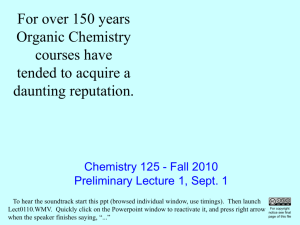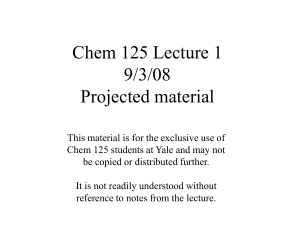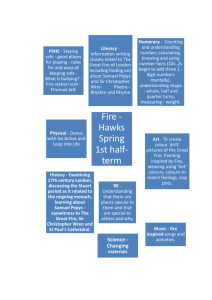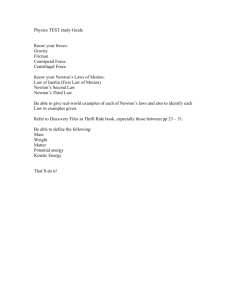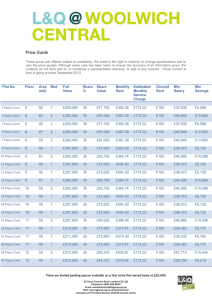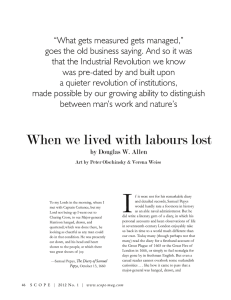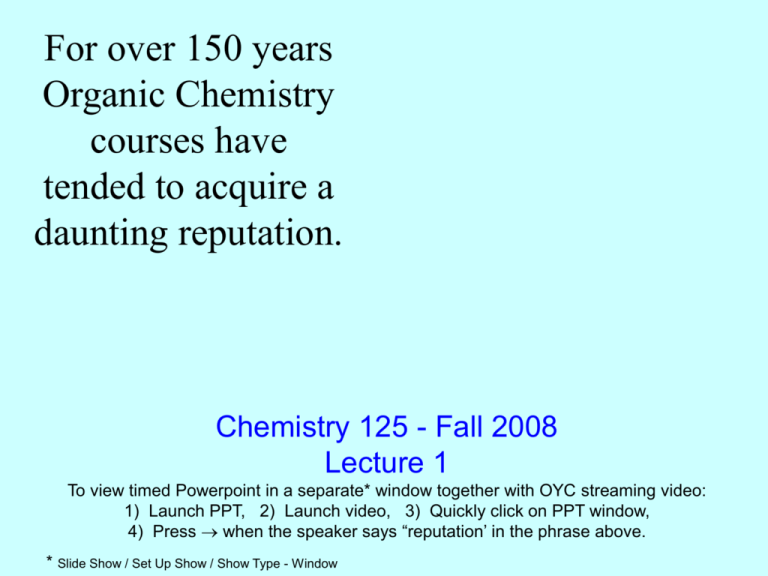
For over 150 years
Organic Chemistry
courses have
tended to acquire a
daunting reputation.
Chemistry 125 - Fall 2008
Lecture 1
To view timed Powerpoint in a separate* window together with OYC streaming video:
1) Launch PPT, 2) Launch video, 3) Quickly click on PPT window,
4) Press when the speaker says “reputation’ in the phrase above.
* Slide Show / Set Up Show / Show Type - Window
For over 150 years
Organic Chemistry
courses have
tended to acquire a
daunting reputation.
Chemistry 125 - Fall 2008
Lecture 1
How Do You Know?
Professor McBride outlines the course with its goals and requirements, including
taking the associated laboratory course. To the course’s prime question “How do you
know?” he proposes two scientifically unacceptable answers (divine and human
authority), and two productive answers (experiment and logic). He illustrates the
fruitfulness of experiment and logic during the rise of science in the 17th Century.
London’s Royal Society and the “crucial” experiment on light by Isaac Newton
provide examples. The correspondence between Newton and Samuel Pepys, diarist
and naval purchasing officer, illustrates the attitudes and habits which are most vital
for budding scientists - especially those who would like to succeed in this course.
The lecture closes by introducing the principal goal for the first half of the semester:
understanding the nature of chemical bonds and their Force Law.
To view timed Powerpoint in a separate* window together with Online Yale Courses streaming video:
1) Launch this PPT, 2) Launch video, 3) Quickly click on PPT window, 4) Press when the speaker says “reputation’ in the
phrase at the top.
If necessary readjust synchrony using pause(||) and run(>) in the video window or and in the ppt window.
* Slide Show / Set Up Show / Show Type - Window & Advance Slides - using timings if present
For copyright
notice see final
page of this file
For over 150 years
Organic Chemistry
courses have
tended to acquire a
daunting reputation.
Chemistry 125 - Fall 2008
Lecture 1
To view timed Powerpoint in a separate* window together with OYC streaming video:
1) Launch PPT, 2) Launch video, 3) Quickly click on PPT window,
4) Press when the speaker says “reputation’ in the phrase above.
* Slide Show / Set Up Show / Show Type - Window
HELP !
PowerPoints / Lecture Notes
Designed for Mac - Compatible with PC & viewer
(please help identify problems)
in-class discussion / e-mail questions
Course Website:
https://webspace.yale.edu/chem125/
assigned problems or questions
previous exams and answer keys
Course Wiki at ClassesV2
initial updates due within 36 hours of presentation
(There will probably be a Text Book for the Spring semester)
HELP !
Instructor : Prof. J. M. McBride (Thurs 1-2:30 or by appt)
Grad Student TAs: Filip Kolundzic (Thurs 7-9 pm)
Nathan Schley (Mon 7-9 pm)
Sign up on-line (pro-forma)
Other Chem 125 students!
Course Alumni (web advice)
Alumni Peer Tutors:
Tina Ho
Justin Kim
Drew Klein
(Sunday 8-10 pm)
10 lectures
Fri. Sept 26
100 pts
9 lect
Exam Dates
Mon. Oct 20
100 pts
9 lect
Fri. Nov. 14
100 pts
9 lect
Wed. Dec 17
300 pts
Wiki Participation
50 pts
Total
650 pts
Semester grade biased by faithfulness in timely problem set submission
Goals of Freshman Organic Chemistry:
• Learn the crucial facts and vocabulary of Organic Chemistry
• Develop theoretical intuition about how Bonding works , and changes
(molecular structure)
(reactivity)
Savoir s'étonner à propos
est le premier mouvement
de l'esprit vers la découverte.
Knowing to be astonished by
something is the mind’s first step
toward discovery.
• Learn enough about how chemistry works
The
characteristic
comment
making
so
that
you know when
to be on
astonished
a discovery
not “Eureka!”
but rather
• Develop
goodisscientific
taste (sense
vs. nonsense)
• Have fun “Huh, that’s funny.”
http://www.lmcp.jussieu.fr/~soyer/cristallo/pasteur_l.html
• Make the scientific transition from school to university
• Learn from this model science how to be a creative scientist
Louis Pasteur
Theory &
Experiment
Why do we require
Chem 126L?
Because Lab
answers the
Big
Big
Question
John McBride
(age 3)
How do you know?
John McBride
(age 38)
How do you know?
2) Human
Authority
1) Divine
Authority
Four
Ways
Science Ignores:
of
1) Divine Authority
&
Knowing
Moses Receives
the Law Tablets
2) Human Authority
But Science is NOT Faith-Based!
Carolingian Bookpainter
~840 A.D.
(British Museum)
Do not suppose that I was a very deep
thinker, or was marked as a precocious
person.
I was a very lively imaginative person,
and could believe in the Arabian Nights as
easily as in the Encyclopaedia. But facts
were important to me, and saved me. I
could trust a fact, and always crossexamined an assertion. So when I
questioned Mrs. Marcet's book by such
little experiments as I could find means to
perform, and found it true to the facts as I
could understand them, I felt that I had got
hold of an anchor in chemical knowledge,
and clung fast to it.
3) Experimental
….Observation
SCL Honor Roll
Michael Faraday, 1858
(to Nat’l Science Teachers Assn. 1966)
Learn from science that
Why
quote
Feynman?
you must doubt the experts…
Because he is an expert?
Science is the belief in
the ignorance of experts.
When someone says
Because
what
he
science teaches such and such,
he is using the word incorrectly.
says makes sense.
Science doesn't teach it; experience teaches it.
If they say to you science has shown such and such, you
Though
literally
might ask, "How does science show it - how did the
scientists findmeans
out - how,
what, where?"
“expert”
someone
who has
Not science
has shown,
but this experiment, this
done
experiments.
effect has shown.
4) Logic
Modern Science got underway
th
in the 17 Century
Robert Hooke (Micrographia, 1665)
Luther
Reformation
Bacon
Instauration
Columbus Copernicus
Navigation Revolution
1500
1600
Newton
Gravitation
1700
Lavoisier
Oxidation
1800
Planck
Quantization
1900
Us
2000
On his scholastic
All theCambridge
philosophytutors:
of nature
which is now received, is
either
the philosophy
the
"Men
of sharp of
wits,
Grecians,
other
of the
shut uporinthat
their
cells
of
alchemists…
a few authors, chiefly
Aristotle,
their Dictator."
The
one is gathered
out of a
few vulgar observations,
and the other out of a few
experiments of a furnace.
The one never faileth to
multiply words, and the other
ever faileth to multiply gold.
Galileo
Shakespeare
(1564-1642)
(1564-1616)
Francis Bacon (1561-1626)
?
Instauratio Magna
Jebel
PLUS
Musa
(Morocco)
Jebel
The Great Restoration
ULTRA
al Tarik
(Gibraltar)
Novum Organum
Inductive Scientific Method to
Pillars of Hercules
replace Aristotelian deduction
Francis
(1561-1626)
Mediterranean - Classical
WorldBacon
- Aristotle
NASA/JPL/NIMA
"Many will pass through and knowledge will be increased.”
Daniel 12:4
Instauratio Magna (1620)
“…that wisdom which we have derived principally from
the Greeks is but like the boyhood of knowledge, and
has the characteristic property of boys:
it can talk, but it cannot generate;”
“…it is but a device for exempting ignorance from ignominy.”
Cf. “Correlation Energy” (Lect 11) , “Strain Energy” (Lect 32)
“…the end which this science of mine proposes is
the invention not of arguments but of arts.”
“…not so much by instruments as by experiments
…skilfully and artificially devised for the express
purpose of determining the point in question.”
“restoration of learning and knowledge”
Ac ne forte roges, quo me
..duce, quo lare tuter,
Nullius addictus jurare in ..
..verba magistri
Quo me cumque rapit .. .. ..
Astronomy
..tempestas,
deferor hospes.
Navigation
Chemistry
.. .. .. .. .. .. Horace (15 B.C.)
Horology
Lest you ask who leads ..
.. me, in what household
.. I lodge,
Meteorology
There is no master in .. .. ..
whose words I am .. .. .. ..
Cartography
bound to take an oath,
Wherever the storm .. .. ..
.. forces me, there I put in
.. as a guest.
Viscount Brouncker
(the late)
(President)
Francis Bacon
“The Royal Society
for the Improving of
Royal
Society
Natural Knowledge
1662
by Experiments”
Bacon’s most important
kind of experiment:
Crucial
“finally decides between two
rival hypotheses, proving the
one and disproving the other”
cross = crux
www.bluestreetjazzband.com
Chapel
Trinity College, Cambridge
“The broken light
“Nec variat lux
does not change
fracta colorem.”
its color.”
Proved (to Newton) that
Light is a Substance,
not Hooke’s pulses.
Experimentum Crucis
How does the
prism make color?
by altering pulses
(à la Hooke & Descartes)
or by separating
existing colors?
Newton’s “Experimentum Crucis” (1666 -1672)
Experiments are
indispensable in
organic chemistry
(an empirical science)
but so is logic.
Believe what I say only
when it makes sense to you.
What if it doesn’t?
How to Succeed
in Chem 125
Samuel Pepys
as a Model
Science Student
Samuel Pepys (1633-1703)
Diary 1660-1669
Saw Charles I
beheaded 1649
B.A. Cantab. 1654
“Clerk of the Acts”
Navy Board 1660
Samuel Pepys (1633-1703)
Diary 1660-1669
July 4, 1662
…By and by comes Mr. Cooper,
mate of the Royall Charles, of
whom I intend to learn mathematiques, and do begin with him
to-day, he being a very able man...
After an hour's being with him at
arithmetique (my first attempt
being to learn the multiplicationtable); then we parted till tomorrow.
Samuel Pepys (1633-1703)
July 9, 1662
Up by four o'clock, and at my
multiplicacion-table hard, which is
all the trouble I meet withal in my
arithmetique.
July 11, 1662
Motivated,
Diligent
Up by four o'clock, and hard at my
multiplicacion-table, which I am
now almost master of…
December 25, 1662
…so to my office, practising
arithmetique alone and making
an end of last night's book with
great content till eleven at night,
and so home to supper and to bed
Samuel Pepys (1633-1703)
December 6, 1663 [Sunday]
…I below by myself looking over
my arithmetique books and timber
rule. So my wife rose anon, and
she and I all the afternoon at
arithmetique, and she is come to do
Addition, Subtraction, and
Multiplicacion very well, and so I
purpose not to trouble her yet with
Division...
Worked with
study partner
Isaac Newton (1643-1727)
Six years later Pepys encountered a “problem” with Dice.
Pepys’s Problem (11/22/1692)
A - has 6 dice in a Box, wth wch he is to fling a 6.
B - has in another Box 12 Dice, wth wch he is to fling 2 Sixes.
C - has in another Box 18 Dice, wth wch he is to fling 3 Sixes.
Q. whether B & C have not as easy a Taske as A, at even luck?
Newton’s Reply (11/26/1692)
What is ye expectation or hope of A to throw every
time one six at least wth six dyes? [etc.]
If the Question be thus stated, it appears by an easy computation
that the expectation of A is greater then that of B or C, that is, the
task of A is the easiest.
Pepys’s Reply (12/6/1692)
...You give it in favour of ye Expectations of A, &
this (as you say) by an easy Computation. But yet
I must not pretend to soe much Conversation wth
Numbers, as presently to comprehend as I ought to
doe, all ye force of that wch you are pleas'd to
assigne for ye Reason of it, relating to their having or
.not having ye Benefit of all their Chances ; and
therefore were it not for ye trouble it must have cost
you;Not
I could
have wish'd for
sight of ye
very
ashamed
to aadmit
when
Computation.
he didn’t really
understand
Insisted on proof
A
B
31031
46656 =
1346704211 =
2176782336
0.6651
0.6187
Pepys “WHY?”
"I cannot bear the Thought of
being made Master of a Jewell
I know not how to wear."
Contrast with:
Willing
tohis
swallow
“I never
went to
office hours
for help
I felt
he would
hisbecause
pride in
thelike
search
makefor
mesolid
feel stupid,
because he is
understanding
superior to me in chemistry.”
(from an anonymous end-of-semester course evaluation - Jan 2007)
Read Pepys & Newton
and get together to do
Problems for Monday.
Contribute to Wiki when asked.
Problems
For Friday (optional):
1) Which two class members have rooms
nearest you?
2) What are the three most common items
of advice from course veterans?
For Monday:
Isotope problems from Pepys & Newton
For Friday (Sept. 12):
1) Draw Lewis Structures for Functional Groups
2) Are Lewis Structures correct?
3) What do Lewis Structures show?
Isotope Ratio Mass Spectrometry
Wiki Assignments
Are There Atoms
& Molecules?
What Force Holds
Atoms Together?
Springs?
http://demo.physics.uiuc.edu
Robert
Boyle
P V = const
Air Pump built by his
servant Robt. Hooke
Robert Boyle
(1627-1691)
1678
Hooke’s Law
Hooke’s Force Law
F = -k x
force
Scale
energy
extension
Hooke’s Law
“Ut tensio
sic vis”
Force x
Potential
2
x
Energy
End of Lecture 1
Sept 3, 2008
Copyright © J. M. McBride 2009. Some rights reserved. Except for cited third-party materials, and those used by visiting
speakers, all content is licensed under a Creative Commons License (Attribution-NonCommercial-ShareAlike 3.0).
Use of this content constitutes your acceptance of the noted license and the terms and conditions of use.
Materials from Wikimedia Commons are denoted by the symbol
.
Third party materials may be subject to additional intellectual property notices, information, or restrictions.
The following attribution may be used when reusing material that is not identified as third-party content:
J. M. McBride, Chem 125. License: Creative Commons BY-NC-SA 3.0

